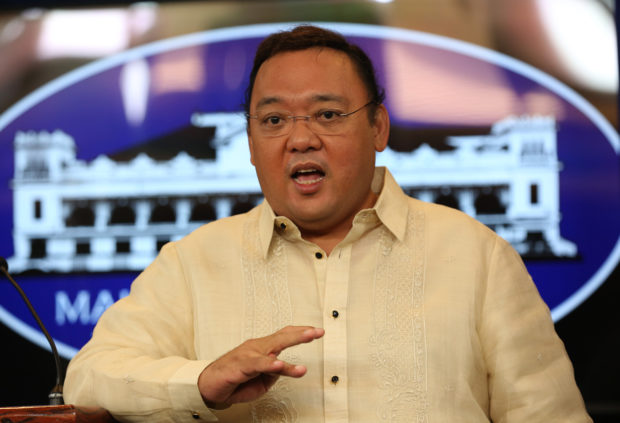
Presidential Spokesperson Harry Roque INQUIRER FILE PHOTO / JOAN BONDOC
Malacañang on Saturday stood by the decision of Solicitor General Jose Calida to withhold police reports on the deaths of about 4,000 suspected drug offenders from the Supreme Court on grounds that this could compromise national security.
To help resolve petitions questioning the legality of President Rodrigo Duterte’s war on drugs, the high tribunal last month directed Calida and Philippine National Police officials to present documents related to the police antidrug operations.
In a petition asking the court to nullify its Dec. 5, 2017 order, Calida on Thursday said that he could not comply with the tribunal’s directive because the documents being sought “involve information and other sensitive matters that in the long run will have an undeniable effect on national security.”
Presidential spokesperson Harry Roque said Malacañang respected Calida’s decision and would leave it up to the Office of the Solicitor General (OSG) to decide on actions to take on the legal challenges to the administration’s anti-illegal drugs campaign.
“The solicitor general is the statutory counsel for the republic,” Roque said in a press briefing in Cebu City. “We respect the decision of the SolGen in this regard, as in fact we respect the SolGen’s position on legal matters that it is defending the republic in any court.”
National security
“We defer to the decision of the Solicitor General, our counsel,” he added.
Sen. Richard Gordon said national security could not be invoked by Calida as legal precedents “since the time of the Americans” supported judicial reviews by the Supreme Court of all executive decisions.
“If you refuse to give information, it means you are hiding something and that’s not good. He should be upfront about these cases that they cannot solve,” said Gordon, chair of the Senate blue ribbon committee, which led a Senate inquiry on the spate of drug-related killings in 2016.
Gordon said the OSG was at risk of being cited in contempt and ordered arrested by the high court if it refused to give the documents.
Sen. Antonio Trillanes IV and detained Sen. Leila de Lima, both critical of Gordon, were on his side this time.
Trillanes said Calida’s petition was meant to be a message to the magistrates to back off from President Duterte’s campaign against illegal drugs.
No such reports
“If they get scared, they will retreat but if they will do their duties, they will not give merit to the petition and even cite in contempt those who refuse to follow their order,” Trillanes said.
The opposition senator believed the OSG refused to provide the high court the investigation reports on drug-related killings because there were no such reports to begin with.
“If police documented these cases of salvage, which is now called extrajudicial killings, they will get in trouble because the evidence will not be consistent,” Trillanes said.
He noted that even during the Senate inquiry into extrajudicial killings two years ago, authorities could not produce the guns that were allegedly used by the thousands of drug suspects killed by police officers for allegedly resisting arrest during antidrug operations.
‘Lame excuse’
“We asked for an inventory of these guns for inspection but there was nothing because they were recycling these weapons,” Trillanes said.
De Lima said national security was a “lame excuse” to defy the high court’s order and a clear indication of a cover-up of the government’s violations of the law.
“No national security is involved in ascertaining the legitimacy of these police operations, particularly in light of the magnitude and pervasiveness of the killings, especially now that the police will resume its ‘Oplan Tokhang’ and ‘Double Barrel’ operations,” De Lima said in a statement from her detention cell.
“These investigation records will confirm our suspicions that many of these slain drug suspects did not resist arrest,” she added.
Success or failure
In his petition, Calida said the production of the voluminous documents would be laborious. More seriously, he said, “it could spell the success or failure of follow-up operations of [the] police and other law enforcement bodies.”
He reminded the court that it was not a “trier of facts” and the documents being sought were “patently irrelevant” to the judicial challenge to the drug war.
“Like all constitutional guarantees, the right to information, with its companion right to access to official records, is not absolute,” he said.
“By requiring the [PNP] to submit the … information and documents, the court has ventured into unwarranted factual inquiries,” he added.